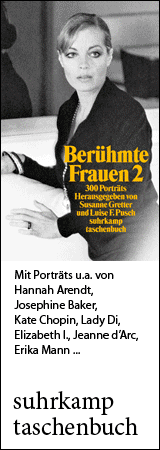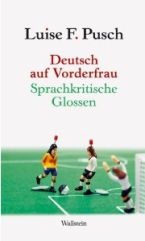
born on January 23, 1935 in Aachen, Germany
died on May 2, 2019 in Konstanz, Germany
German writer
90th birthday on January 23, 2025
Biography
Marlene Stenten was born in Nazi Germany, grew up during the war, and came of age in Aachen in the 1950s. The second of three daughters in a family that ran a grocery store, she trained as a bookseller in 1957. She worked in this profession before she moved to Berlin in 1969. Luchterhand published her first novel, Grosser Gelbkopf (t: Big Yellowhead), in 1971, which recounts the homosexual awakening of a primary school teacher. The volume of short stories that followed, Baby, was also praised by literary critics. Women were not yet at the center of her works. Marlene Stenten was considered highly talented and received literary scholarships.
This changed abruptly when she submitted her first lesbian novel: the Luchterhand publishing company rejected the text. The same thing had happened to Johanna Moosdorf who received a similar rejection from Suhrkamp when she submitted a manuscript about lesbian love after having published two novels.
By that time, the magazines and novels of the 1920s had been forgotten. The National Socialists had crushed the lesbian subculture and it was impossible to pick up where they had left off after the war. It was only during the new women's movement that lesbian women began to organize. Starting in the mid-1970s, they founded publishing houses, magazines and bookstores that made political and literary texts accessible and created spaces for lesbian perspectives and topics.
Unable to find a publisher, Marlene Stenten chose in 1977 to work with the Sudelbuchverlag, newly founded by Irmgard Dalinghaus, which then published both her novel Puppe Else and the short story collections Die Brünne and Salomé 89. The novel Albina and the collection of short stories Hallo Mäuschen! (Hello Little Mouse) were published at the end of the 1980s by the Zurich-based eco-Verlag.
Marlene Stenten wrote of lesbian ways of life “with sparkling irony and loving mockery” (Berliner Lesbenpresse) in the texts published between 1977 and 1991 when she herself was between the ages of 42 and 56 and had contacts with women in the women's movement and at the university. In 1979, Marlene Stenten moved to Lake Constance to be with her girlfriend. She held readings and built contacts in Switzerland in places were feminists met. Some of her texts appeared first in the Swiss lesbian magazine Frau Ohne Herz.
In Albina, the first-person narrator recounts her relationship from the beginning to the end. She is fascinated by her successful girlfriend's creativity, but she also feels increasingly threatened by her lover's intelligence and education. She fears no longer having the space, time or peace to devote to her own writing and thoughts. She is afraid of losing her creativity and she sometimes chooses to hide behind the mask of a child, playing tricks and writing in rhymes and puns. The first-person narrator is unsparing in the way she treats her characters and herself, observing them closely and describing their vulnerabilities, with humor sometimes turning into biting criticism: “I bare my wolf teeth. I open my wolf mouth.”
In recent years, I have visited Marlene Stenten several times in her apartment in Konstanz and talked with her about literature and life on the balcony with a view as far as the Alps. She reads intensively and writes because it is part of her life. There has been nothing published for years, and the magazine Frau Ohne Herz no longer exists. But Albina, Hallo Mäuschen and Grosser Gelbkopf are still available from edition8 (the successor to eco-Verlag). Perhaps new paperback editions of her works will soon be made available by Fischer.
At a party in 2007, she read a text that ended with: “I remain always someone searching, for a community, for my group – and I only leave when I have no other choice.”
Marlene Stenten died on May 2nd, 2019 in Konstanz, Germany. She was 84 years old.
(Text von 2015, updated 2019; translated with DeepL.com; edited by Ramona Fararo, 2024. Please consult the German version for the complete text of her remarks in 2007 and for additional information, pictures, sources, videos, and bibliography.)
Author: Madeleine Marti
If you hold the rights to one or more of the images on this page and object to its/their appearance here, please contact Fembio.



